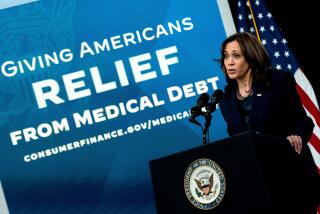Forgive the Debt of the Dying Millions
- Share via
When world leaders meet this week to discuss the fight against global AIDS, the real questions will be how to finance the war and who will provide such financing, especially in Africa, where 70% of the world’s 35 million people living with HIV or AIDS are struggling to stay alive. Unless the external debts of African countries are canceled outright this year, any overall strategy to defeat AIDS will surely fail.
To suggest that Africa can even survive the onslaught of AIDS with a scattering of philanthropy, while continuing to pay far greater amounts to international financial institutions, is a cruel fantasy.
The Global AIDS Fund, launched in April by U.N. Secretary-General Kofi Annan, is an important vehicle for financing the treatment and prevention activities necessary to defeat AIDS. Yet, as the world’s richest countries falter in coming forward with adequate contributions to reach the fund’s modest target of $10 billion, they are neglecting the most obvious way to enable African countries to tackle the crisis themselves. If the richest creditor nations and institutions in human history are serious about confronting the worst plague in human history, they must cancel Africa’s debt and remove the major economic obstacle to African efforts to fight AIDS.
Africa’s external debt now tops $300 billion, costing its governments more than $13 billion annually in debt service payments. The result is that they have paid more in debt service to the World Bank, International Monetary Fund and rich governments during the past two decades than they have received in development assistance or in new loans. As a result, African governments have been forced to divert more and more money from basic social services to the debts. Africa’s debt burden has led to a dramatic decline in human development indicators (such as life expectancy) and an increase in extreme poverty and has contributed to the loss of more than 16 million lives to AIDS.
Debt cancellation would immediately permit a greater financial commitment from African governments to tackle the crisis. At April’s HIV/AIDS summit in Abuja, Nigeria, African leaders demonstrated their commitment to fighting the pandemic by agreeing on a target of spending at least 15% of their national budgets on health, two or three times current levels. A recent study of countries that have received some debt relief illustrates that the majority of the resources freed up have gone to health and education and to combating the AIDS crisis. Debt cancellation would make a real difference.
Canceling Africa’s foreign debt is also affordable. Recent studies show that the World Bank and IMF could easily absorb the write-off without negatively affecting their credit rating, while the treasuries of rich creditor countries already hold the debt on their books at a vastly discounted rate (10% of the actual figure) in tacit acknowledgment that poor countries will never be able to repay the full amount anyway.
It is time to face facts. Money is being drained out of Africa far more quickly than it is trickling in. Without definitive debt cancellation, new funding to combat HIV/AIDS, while desperately needed, will be wholly inadequate. Unless African governments control their own resources and can direct spending toward health care infrastructure and delivery systems and prevention and treatment programs, international donations will do little in the face of the raging pandemic.
If the debt is not canceled, the fight against AIDS in Africa will surely be lost.
More to Read
Sign up for Essential California
The most important California stories and recommendations in your inbox every morning.
You may occasionally receive promotional content from the Los Angeles Times.










